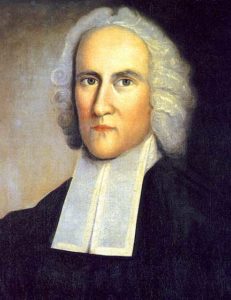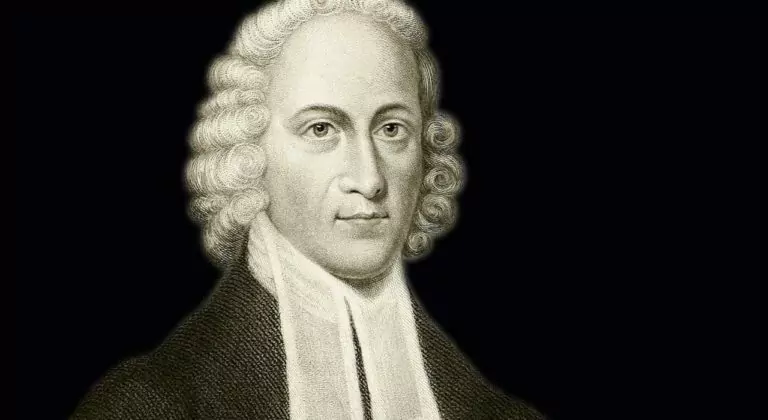Much like today, during the early colonial years in America, preachers rarely spoke about the wrath of God – this did not seem the type of topic to draw in the masses. One man, however, thought very differently. He brought the message of God’s wrath and, in doing so, ignited a revival which spread throughout the colonies.
Jonathan Edwards was born on October 5, 1703, in East Windsor, Connecticut and began preaching in 1722. Although hell and God’s wrath are unpleasant topics, Edwards became one of America’s best-known evangelists by preaching on just these topics. We can get an understanding of how God used him to spark a revival across the colonies by looking at three specific sermons Edwards delivered at different points throughout his ministry. Through these sermons he taught the reality of God’s wrath by:
- showing how it will destroy unrepentant sinners
- explaining that it is the power of God which can save them from this wrath
- warning that those who do not glorify God are deserving of destruction
Edwards knew that the themes of wrath and hell needed to be taught to cause the hearts of those listening to be convicted about their sins and to realize the reality of eternal punishment.
#1: When the wicked have filled up the measure of their sin…
He began preaching on the subject in May 1735 when he delivered his sermons “When the wicked shall have filled up the measure of their sin, wrath will come upon them to the uttermost.”
Edwards’ text was 1 Thessalonians 2:16, which reads, “To fill up their sins always; for the wrath is come upon them to the uttermost.” He immediately presented a picture of hell and never let go of that illustration throughout the sermon. He clarified that God enacts His wrath “very dreadfully in this world; but in hell wrath comes on them to the uttermost.” God executes his wrath on the sinners in this world to a smaller extent, either outwardly on the body or inwardly on a mental or emotional scale. However, “these things are only forerunners of their punishment, only slight foretastes of wrath.” When God’s full wrath comes upon them, it will come with no restraint and no moderation of degree, for “His heavy wrath will lie on them, without any thing to lighten the burden or to keep off, in any measure, the full weight of it from pressing the soul.”
Perhaps the most powerful point Edwards made in this sermon is that once the day of judgment comes, the wicked are sealed in their punishment eternally. There is no longer any chance for repentance or forgiveness once death has come. This is a message that the content Christians in the pews needed to hear. Without knowing the reality and severity of hell, the sinner did not feel a need to repent.
Edwards concluded by noting how dreadful the wrath will be, for it is given by the One who created the universe, shakes the earth, rebukes the sea, and shines His majesty over wicked men. The judgement of God is certainly coming, but it will not be known until it comes. Therefore, Edwards begged everyone listening to “haste and flee for their lives, to get into a safe condition, to get into Christ.” This sermon carefully presents the danger of those who are content with living in sin, and it presses the message of hell to convict them of their rebellion.
The reaction to this sermon inspired many in New England to change their lives. However, much more was to come when, six years later, Edwards preached his most famous sermon.
#2: Sinners in the hands of an angry God
On July 8, 1741 Edwards delivered “Sinners in the hands of an angry God” in Enfield, Connecticut. He was not supposed to preach that night, and he had preached that same sermon before at his home church. He happened to have his manuscript with him, and after receiving the last-minute request to fill in for the pastor, he preached a message that had an amazing effect on many of the hearers, spurring on a revival.

Jonathan Edwards was born on October 5, 1703, in East Windsor, Connecticut to his father Reverend Timothy Edwards and his mother Esther, the daughter of Reverend Solomon Stoddard. Stoddard would become a mentor to Jonathan. Edwards attended Collegiate School, later called Yale College, graduating in 1720. In 1722, he accepted a call to a Scotch Presbyterian church in New York. He then went to Bolton, Connecticut in 1723. In 1724, he became a teacher at Yale College, and finally succeeded his grandfather Reverend Stoddard at Northampton, Massachusetts in 1727.
The text of this sermon was Deuteronomy 32:35, which says, “Their foot shall slide in due time.” Edwards opened his sermon by saying:
“In this verse is threatened the vengeance of God on the wicked unbelieving Israelites, who lived under the means of grace…yet remained void of counsel.”
He began by stating that all sinners are exposed to destruction, a destruction that is unexpected and brought about by the sinner himself. The only reason why this destruction has not yet come is because of the mere mercy of God, which He gives under no obligation but by grace. Edwards was keen on portraying the power of God by reminding his listeners that even the strongest man has no power over God, and not even the mightiest fortress can defend against Him. He emphasized the fact that sinners deserve to be cast into hell, saying that they are the objects of the anger and wrath of God. He painted a vivid picture by declaring:
“the wrath of God burns against them, their damnation does not slumber; the pit is prepared, the fire is made ready, the furnace is now hot, ready to receive them.”
Edwards revealed the reality of death and claimed that God is under “no obligation by any promise” to keep sinners out of hell. God is provoked by sin, and nothing can be done by sinners to appease that anger. Edwards was trying to “awake unconverted persons in the congregation… who find [they] are kept out of hell, but do not see the hand of God in it.”
Edwards ended his message by urging the congregation to consider the danger that they were in, that if they did not change their lives for Christ they were in danger of suffering an everlasting wrath, where “it would be dreadful to suffer…one moment; but you must suffer it to all eternity.” The Christians of the early British colonies had forgotten that if God withdrew His hand from them, they would fall into the depths of hell. This is what it means to be in the hands of an angry God, that sinners are born again and made new creatures because the God of wrath and justice found pleasure in making the damned soul worthy of salvation. Edwards pushes the reality of God’s wrath and hell, a topic which was rarely preached. It is this topic which ignited a revival.
The effect of this sermon was immediate and powerful. According to one listener, even before the sermon was done “there was great moaning and crying out – ‘What shall I do to be saved?’…[the] amazing and astonishing power of God was seen.” Another eyewitness, Stephen Williams, wrote:
“Mr. Edwards of Northampton…preached a most awakening sermon…‘Oh, I am going to Hell,’ ‘Oh, what shall I do for Christ,’ and so forth…went out through [the] whole [Church].”
Edwards was able to vividly portray the wrath of God on sinners, causing those who heard him to know the true condition of their hearts. A revival swept through the towns. Hymns were sung, taverns were closed, and young people poured into churches. Congregants arrived at church hours before the service in order to get a seat in the sanctuary. It is estimated that 10 percent of New England was converted during this time. That is equal to 28 million people today. Clearly, Jonathan Edwards sparked a revival in Enfield.
#3: Wicked men useful in their destruction only
While that might have been Edwards’ most famous and impactful sermon, he continued to tell the people of New England about the reality of God’s wrath. In July 1744, he preached a sermon called “Wicked men useful in their destruction only,” and as the title suggests, his main point was that “if men bring forth no fruit to God, they are wholly useless, unless in their destruction.”
His message was from Ezekiel 15:2-4, which asks what the worth of a dead vine is. The answer is that “it is cast into the fire for fuel; the fire devoureth both the ends of it, and the midst of it is burned” (Ezek. 15:4). Edwards expanded on this passage by comparing sinners to the vine, saying that the dead vine which is good for nothing deserves the same fate as a dead sinner: utter destruction.
Edwards claimed that the only two ways in which a person is useful is either in acting or in being acted upon. A person is useful in acting when they display the “fruits of the Spirit” and use them for the love of God and neighbour. If, however, a man does not do this, then there is no purpose for him to exist. Yes, there are other uses for mankind, as man was made for one another to be friends and neighbours. However, these are inferior ends and are subordinate to the main purpose, which is to serve and glorify the Creator. Therefore, since a wicked man cannot glorify God, he is only useful passively by being destroyed. Edwards claimed that it goes against God’s justice to let wicked men “live always in a world which is so full of divine goodness…that this goodness should be spent upon them forever.” Even though the world is full of sin, so much of God’s undeserved blessings can be seen and enjoyed. The rest of creation is made subservient to mankind, which is wasted on men who bear no fruit for God. The only use that wicked men can be is in their destruction for God’s glory, by both having God’s majesty and justice acted upon them and by being an example to the righteous, giving them “a greater sense of their happiness and of God’s grace to them.”
Edwards applied his point so that all may learn the justice and righteousness of God. God takes no pleasure in the death of the wicked, but no one blames a farmer who cuts off a tree which no longer bears fruit. Edwards is calling his congregation to consider all the good things God has bestowed on them, including having a soul which houses the Holy Spirit and by having hosts of angels working for them. All of creation works for man’s pleasure, so “how lamentable it is, then, after all these things he should be a useless creature.” The one who is useful will experience pleasure in this world, and the pleasures will be even more wondrous in the world to come. However, those who do not continue “to bring forth any fruit to the divine glory, hell will be the only place fit for [them]…[where] nature ceases to labour any more for sinners.” Again, Edwards is stressing the point that God’s wrath is real, and unrepentant sinners will suffer it.
Conclusion
Jonathan Edwards inspired many revivals through his preaching by talking about God’s wrath and hell, topics that were unpopular to the crowd and avoided by other preachers. Through this unpleasant topic, Edwards ignited a fire of repentance in the hearts of the people of New England. His sermons presented God’s wrath by showing how He will destroy unrepentant sinners utterly, how it is the power of God which can save them from His wrath, and how those who do not glorify God are only useful to be destroyed.
Texts are quoted as Edwards translated them in his sermon manuscripts.












